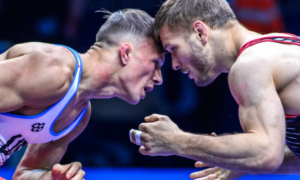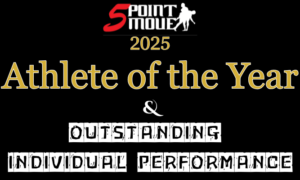However many highlights the 2017-18 Senior Greco-Roman season provides, Sunday’s dual meet pitting the United States against Serbia is very likely to be one of them.
In order for a Greco dual of this magnitude to offer legitimate appeal to casual audiences, bombs have to be thrown. Whether we’re talking about offensive fireworks or violent, dramatic struggles decided in the pummel, wrestling fans who are newer to the classical style require some element of suspense and/or spectacular throws to keep them engaged throughout. Just by glancing at the match-ups below, it is easy to get the sense that is exactly what might be in store for those in attendance or watching at home.
As of press time, tickets for the USA vs. Serbia dual meet are still available ($10 for adults, $5 for students). The action takes place at Bishop Kelly High School in Boise, Idaho at 3:00pm (MT) and can be viewed live on FloWrestling.
In the meantime, let’s take a look at just what it is some of these matches have to offer — and why this event is as can’t-miss as it gets for United States Greco-Roman given the current climate. (Quick note: weights are approximate)
Team USA vs. Team Serbia Featured Match-Ups
62 kg: Ildar Hafizov (USA/Army) vs. Kristijan Fris (SRB)
A lot of folks are pointing at the bout below as the marquee match-up of the proceedings, but Hafizov/Fris could outright steal the show. Part of that has to do with their longevity. These two go back a ways. The last time they met was at the 2008 Beijing Olympics in what was a win for Fris. They are also of a similar age — Hafizov is 30, Fris, 33. But don’t let that 33 fool you. Fris won his World bronze in 2007 and while he still remained a world-level threat from then on, there weren’t a whole ton of notable placings at important events. That changed in 2017. Just a couple of weeks after his birthday, Fris won the European Championships for the first time in his career, which as you might imagine, quickly quieted any talk of his slowing down.
As for Hafizov, his time in the US thus far has been nothing short of impressive. In his first full year with the Army, he managed to advance to the best-of-three finals at the 2016 US Olympic Trials, falling to Jesse Thielke (NYAC) in consecutive bouts. Hafizov underwent a procedure on his knee soon thereafter, but he came back strong with a gold at the Thor Masters Invitational in Denmark which preceded his victory at the 2017 Trials.
Since both wrestlers hold fast to the feel-heavy European style, fans should expect some spirited jousting in the ties leading to the first par terre, a position from which Hafizov is a master. If he is willing to lift Fris and go for big scores, that could put the edge in his favor (should he get the first crack at it). With the rule update and its subsequent emphasis on “active wrestling”, it could be that whoever puts a crooked number up on the board first wins. Fris has a tendency to come on late, anyway, so Hafizov’s best chance to draw blood will likely come in the opening period. Regardless of how it unfolds, don’t expect this bout to end early. We’re talking about two wrestlers who boast more combined experience than every other tandem taking the mat in Boise and neither one of them is going to go down easily.
73 kg: Alex Sancho (USA/NYAC) vs. Davor Stefanek (SRB)
The opportunity to lock antlers with a World and Olympic Champion is one Sancho is most assuredly feverish about. To many US fans, this is the main event. But it isn’t due to each wrestler’s accomplishments because Stefanek dwarfs him in that department, what with a Junior World gold back in 2005, a Senior World title in ’14, and of course, his win in Rio. Instead, this is more about where Sancho is now at this stage in his career why this bout seems so enticing.
Over the past few years, the native Miamian has established himself as a willing and capable competitor against foreigners, an attribute bolstered further in 2017 thanks to a gold at Zagreb and a silver at the Tbilisi Grand Prix. Sancho washed out early in November’s U23 Worlds, and that can’t be completely dismissed. But if you were to ignore that one isolated performance, what’d you see is an athlete still very much on the rise.
Following the Rio Olympics, Stefanek, 32, swarmed back into action at the World Wrestling Clubs Cup and then five months later was drilled in the finals of the European Championships by (now) two-time World bronze medalist Artem Surkov (RUS). And that’s the last we’ve seen of him in a competitive situation.
Is age a factor here? Probably not, though Stefanek has a good nine years on Sancho. And even though he didn’t knock it out of the park at the Euros, Stefanek still looked plenty quick and durable leading up to his final, specifically in his matches against Andreas Vetsch (SUI) and Mate Krasznai (HUN), respectively. The Serbian can turn it on an instant and very few at either 67 or 72 kilos possess the uncompromising fortitude necessary to slow down his attacks, especially when he cuts angles and gets to the body. For his part, Sancho’s biggest strength in this match will be his willingness to open up. Stefanek is too good for Sancho to remain comfortable giving up position for an inordinate amount of time, but if the American makes an impression early on, you should have a dogfight on your hands.
74 kg: Patrick Smith (USA/Minn. Storm) vs. Aleksandar Maksimovic (SRB)
Maksimovic is another Serbian who has been around for a long while, having started his career on the Senior circuit over a decade ago. His highest placing at a World event is fifth — twice — first in 2013 and then again at the’16 Non-Olympic edition. But while he may not have top-tier hardware to his name, make no mistake about it, Maksimovic is an extremely dangerous competitor with plenty of solid placings elsewhere, including a bronze at last year’s European Championships which followed a runner-up performance in 2016.
Three-time Pan Am Championships winner Smith may not have the years logged Maksimovic does, but it doesn’t feel that way. We’re now entering Year 5 with the Minnesotan as a Senior athlete and he has more than made his mark due to his trio of runner-up showings at the World and Olympic Trials. He’s also a University silver medalist from 2014, a feat that had been obscured primarily because folks couldn’t get over all those domestic second places. Smith never wilted and with an extended training cycle in Sweden last winter under his belt, was able to put together his best campaign yet. 2017 saw Smith snag a bronze in Denmark, finally win the Trials, and notch his third Pan Ams gold.
Maksimovic came up short against 2014 World silver Yunus Oezel (TUR) in the finals at last weekend’s Zagreb Open and Smith hasn’t competed since he went 1-1 in Paris. None of this makes a difference. They are both pressure fighters, although Maksimovic has displayed a more pronounced inclination to grab fingers and wrists. It’s absolutely not a knock, just what it is. The Serbian also owns above-average par terre defense, so if this thing stays tight that could decide the outcome. Everyone and their uncle knows what Smith is about — a high intensity, pace-pushing approach that has welcomed in a few new transitional wrinkles which can lead to scores.
Out of every bout on the card, Smith/Maksimovic wields the highest potential for a brawl. That may mean points are hard to come by (and they probably will be), but fans might also be treated to a bite-down-and-suck-it-up six minutes of action that unravels at a brisk-enough tempo to keep all witnesses engaged. And that’s the entire goal of this event to begin with.
80 kg: Kamal Bey (USA/Sunkist) vs. Viktor Nemes (SRB)
If a bout between two reigning World champs isn’t enough to elevate some heart rates, nothing will.
Before Nemes won the 75-kilogram World title back in August, he was known as a very skilled and experienced competitor who offered tremendous upside. Remember — despite his vast resume, the guy is still only 24-years-old. Even in a sport where champs keep getting younger, 24 is just fine. Coming off of his eighth-place finish in Rio, Nemes showed why his stock was on an upswing with his mesmerizing win over Elvin Mursaliyev (AZE) in the finals of the Golden Grand Prix. That tournament began the best run of Nemes’ career, as he scored medals at five of his next six events with a bronze, a silver, and three golds (counting the Paris Worlds).
By now, everyone in America is intimately familiar with Mr. Bey’s record of late. He stormed into the international consciousness on the strength of his electrifying waltz towards World glory and made his second World Team of the season with his triumph at the U23 Trials two months and change later. Like Sancho (and practically all of his teammates in Poland), Bey fell flat in the first round of the U23 Worlds in an uncharastically dreary affair. With how busy he has been since becoming a full-time star, it’s worth questioning if fatigue resulting from two long seasons played a role in his performance.
Assuming Bey is operating at his highest capacity, this match-up with Nemes is going to provide sparks from beginning to end. It has to be this way. If Bey is roundly admired for one thing, it is his innate ability to perform when the lights are at their brightest. And he’s not expected to win here. Immaterial. Look for Bey to bring the heat early and often in effort to catapult into one of those bodylocks. Is Nemes too sharp to fall in that kind of trap, the kind where Bey hand-fights and shucks his way to a clearing? It’s hard to tell. The one thing you can bet on is that Nemes has never faced anyone who can (and is willing to) light it up quite like Bey. This match is worth the price of admission by itself.
Notes:
- As indicated below, 2012 University World Champion Max Nowry (55 kg, Army/WCAP) will no longer be competing in the dual. Nowry’s and Tamas Nad were reportedly deemed to be too far apart in weight to make the match. In Nowry’s place will be the monster known as multi-time US National Team member Ryan Mango (63 kg, Army/WCAP).
- Another match-up change has also been announced. Serbia’s Mikhell Kaijai, who took third on Saturday in Croatia, is on the shelf, leaving 2017 US World Team Trials runner-up Hayden Zillmer (97 kg, Minnesota Storm) without a bout.
- The dual meet and accompanying camp at the Suples Training Center does not represent the first trip to the US for several of the Serbian athletes. Fris, Stefanek, and Nemes have all competed on American soil before, specifically at the Jacob Curby Cup in 2013. At that event, Fris won the 60-kilogram weight class, Nemes placed sixth at 74, and Stefanek took third — also at 74.
USA vs. Serbia — February 11th (Boise, Idaho)
60 kg: Ryan Mango (USA/Army) vs. Tamas Nad (SRB)
62 kg: Ildar Hafizov (USA/Army) vs. Kristijan Fris (SRB)
73 kg: Alex Sancho (USA/NYAC) vs. Davor Stefanek (SRB)
74 kg: Patrick Smith (USA/Minn. Storm) vs. Aleksandar Maksimovic (SRB)
80 kg: Kamal Bey (USA/Sunkist) vs. Viktor Nemes (SRB)
81 kg: John Stefanowicz (USA/Marines) vs. Zarko Dickov (SRB)
87 kg: Ben Provisor (USA/NLWC) vs. Nikolai Bodrev (SRB)
87 kg: Barrett Stanghill (USA/Minn. Storm) vs. Vladimir Stankic (SRB)
SUBSCRIBE TO THE FIVE POINT MOVE PODCAST
iTunes | Stitcher | Spreaker | Google Play Music | RSS














